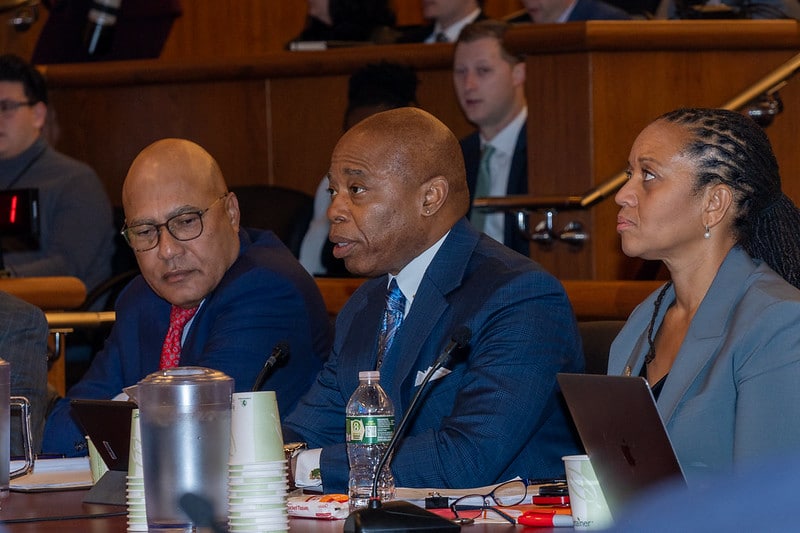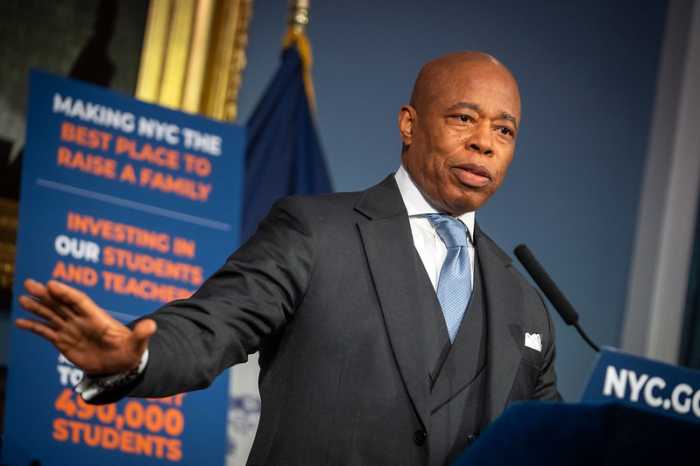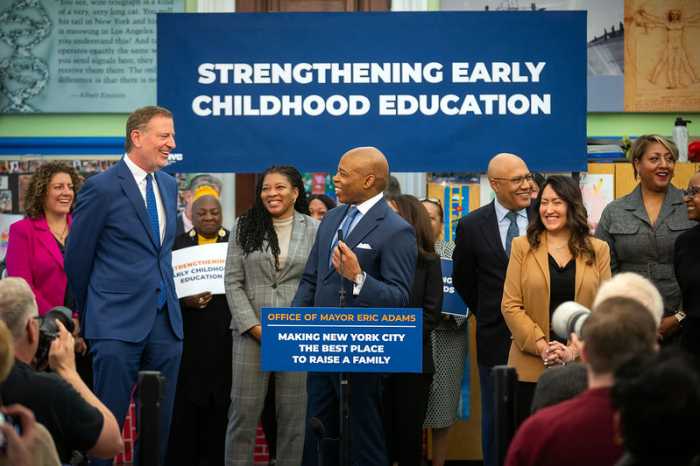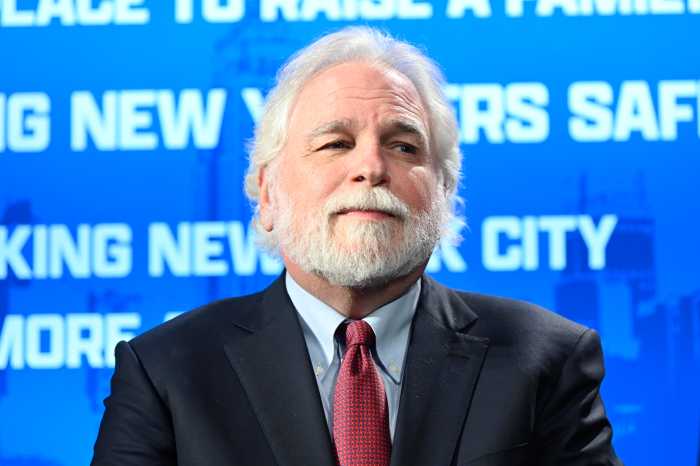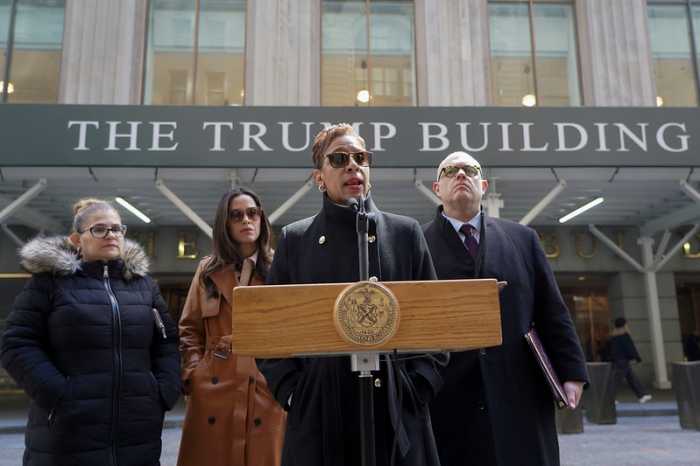With hat in hand, Mayor Eric Adams made his annual pilgrimage to Albany on Tuesday to again implore state lawmakers for more migrant crisis aid — along with another four years of mayoral control of public schools and a bevy of housing reforms.
Hizzoner traveled to the state capital for the annual event known as “Tin Cup Day” — a pilgrimage of local officials appealing to state lawmakers for greater funding in the upcoming budget — against the backdrop of criticisms that he has struggled to score many wins there during his first two years in office, something that he fiercely denies.
The mayor made his case Tuesday morning during a joint hearing of the state Senate Finance Committee and Assembly Ways and Means Committee, asking that the state shoulder 50% of the city’s projected $10.6 billion migrant crisis tab — amounting to $4.6 billion.
Adams called for the same halfway split last year, but Gov. Kathy Hochul and the state legislature declined to go that far, giving the city around $1 billion instead. When she rolled out her 2025 executive budget proposal last month, Hochul proposed another $2.4 billion in migrant aid for the city this year.
But the mayor’s budget director, Jacques Jiha, said Tuesday that the figure actually contains just $1.1 billion in newly-committed funding. In addition, Jiha argued, the state money is far from enough to cover the expense because it is based on an assumed three-way cost split between the city, state and federal government — and the feds have given far less than a third, only $156 million to date.
With the expectation that Washington will not come through with substantially more support any time soon, Adams called for the state to step up its allocation.
“New Yorkers are already carrying most of the asylum seeker costs,” Adams said. “It is wrong to ask them to do more, and it puts our city in a precarious position. Today, we are asking the state to increase its commitment and cover at least 50% of our costs.”
The $1.3 billion portion of the $2.4 billion that Hochul already committed is going towards paying for large-scale migrant tent shelters — known as Humanitarian Emergency Response and Relief Centers (HERRCs) — at the Creedmoor Psychiatric Center in Queens, Randall’s Island and Brooklyn’s Floyd Bennett Field, Adams said. The $1.1 billion in newly committed funds will pay for housing, food and other services for the roughly 67,000 migrants still in the city’s care.
When asked by Manhattan state Sen. Brad Hoylman-Sigal if he would commit to restoring the deep budget cuts made in November and last month once receiving the new state funds, Adams said that the $2.4 billion Hochul plans to give the city would not be enough.
He enacted the cuts to balance the budget in the face of mounting costs partially driven by the migrant influx.
“This is a moving crisis that … we don’t see an end to,” the mayor said, while pointing to some restorations he made last month to service cuts at the NYPD, city public libraries and Education Department.
“As much as we can prevent the upcoming [cuts], we would like to do so,” he added.
Keeping control
The mayor also made the case for retaining control over the city’s public schools for the next four years, a move that Hochul called for in her State of the State address last month.
While Adams is making the case for continued mayoral control based upon he and Education Chancellor David Banks’ record of running the city’s public schools over the last two years, the four-year extension he is asking for would exceed the end of his first term in 2025.
Mayor Adams is asking for the extension of mayoral control, which he calls mayoral accountability, after it was renewed for just two years ago in 2022.
“Mayoral accountability allows us to make much needed systematic changes quickly, efficiently and equitably,” Adams said. “Under the current system the buck stops with me and you’ve seen that we were able to produce results.”
The mayor said improved math and English language arts scores among the city’s public school students last year was a direct result of his leadership as was his ability to implement a new phonics-based reading curriculum. He insisted his control of public schools has also helped his administration in quickly responding to pressing issues like integrating thousands of migrant children into the system.
However, mayoral extending mayoral control often meets skepticism and pushback from state legislators.
In a tense exchange, progressive Assemblymember Jessica González-Rojas (D-Queens) asked the mayor how parents could trust him with running the schools given that he recently slashed the Education Department’s budget by hundreds of millions of dollars.
“We’re losing our talented teachers, and our students are struggling,” González-Rojas said. “I ask as a mom, how can we trust you? Why should we trust you with mayoral control?”
Adams responded by pointing to his purported success in helming the system, adding that he found it “surprising” that the Assemblymember would not trust him given his track record.
State Sen. Robert Jackson (D-Manhattan) also voiced concerns. The lawmaker cited a public hearing on mayoral control, where he said that many stated it was not working and they wanted to adopt a new school governance model.
“About 60 people spoke and talked about that mayoral accountability, control, is not working,” the senator said. “And they want to move to a transition over a period of time, similar to other cities in the United States.”
The mayor also made another push for reforms aimed at building more rental housing throughout the five boroughs, as the city continues to struggle with skyrocketing rents and rampant homelessness. Those reforms include creating a new affordable housing tax incentive to replace 421-a, allowing more building density by raising the floor-area ratio (FAR) cap and legalizing basement apartments.
While Adams indicated he would support some form of tenant protections in a broad housing deal, he made it clear that does not mean passing “Good Cause Eviction” legislation, which would cap rents for rent-regulated units and prevent landlords from evicting tenants for any reason.
“I didn’t say I support Good Cause, I said I support tenant protections,” Adams told reporters in a news conference following the hearing. “I think that lawmakers, with all of the entities involved, will come together and come to a solution. I think we can land this plane of dealing with our inventory problem and dealing with the concerns of those that are advocating for tenant protections.”



